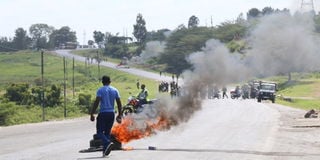Lobby groups call for urgent police reforms to end police brutality

A protester walks past a bonfire lit along Nakuru-Kabarak road during protests on June 10,2025.
Recently, Nakuru County has found itself in the spotlight for all the wrong reasons, with rising cases of police brutality and harassment of journalists, as well as fatal shootings which are allegedly linked to law enforcement officers.
The latest tragedy, which is still fresh in the minds of many, is the fatal shooting of Daniel Nderitu at Hilton estate in the London area of Nakuru.
As Daniel was laid to rest on June 20, 2025, the community was gripped by grief and anger, with calls for justice growing louder by the day.
His story is just one among hundreds — names and faces of people whose lives were cut short by those entrusted to protect and serve.
Mwaura Gitonga, the Chairperson of the Nakuru Peace Forum, has expressed deep concern over the escalating incidents of police brutality and extrajudicial killings across the county.
"While many of these cases might appear isolated, the frequency with which they're occurring paints a very troubling picture," says Gitonga. "What we saw during the protests in the London Estate shows that all is not well in our communities."
He warns that the integrity of the police force is crumbling, and with it, public trust.
“The police are supposed to uphold the law. When they instead become the lawbreakers, community trust erodes — and that’s a dangerous place for any society to be," he says.
Mr Gitonga also notes that young people are increasingly aware of the broader implications of these incidents, often linking local tragedies to national patterns of systemic abuse.
He says the result is rising resentment against authority, resentment that simmers just beneath the surface until it inevitably explodes.
Beyond the emotional toll, the economic and social impacts are tangible. During periods of unrest, many people lose their livelihoods as fear and instability push communities to breaking point.
Calvin Muga, Programmes Officer at Midrift Hurinet, shares similar sentiments. He traces part of the problem back to how police officers are trained.
"The police were historically trained under a 'force' mindset — before the shift from 'Police Force' to 'Police Service'," Muga explains.
"But the name change didn't come with a change in attitude. That cultural and psychological transformation should have been part of the police reforms, but it never truly happened."
According to Mr Muga, this issue is exacerbated by a culture of impunity among some officers.
"There’s a legal framework in place, but when officers decide to operate outside of it, it becomes a serious problem," he says.
To address these deep-rooted issues, Mr Muga proposes reforms starting at the very foundation: police training academies. He advocates integrating a human rights-based approach into training that is grounded in Kenya’s constitution and relevant laws.
However, training alone is not enough. Rebuilding trust requires open dialogue and mutual accountability.
"We need platforms where the police and community members can come together, face the hard truths and work out collaborative solutions," Mr Muga says.
As Nakuru mourns yet another victim of police violence, the demand for justice grows louder. However, beyond the tears and protests lies an urgent need for systemic change — a transformation that can only begin when those who uphold the law are held accountable and the community is no longer treated as the enemy.


